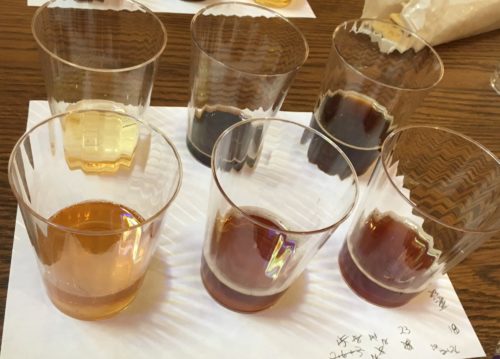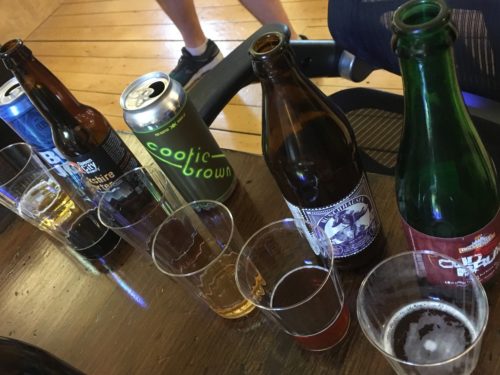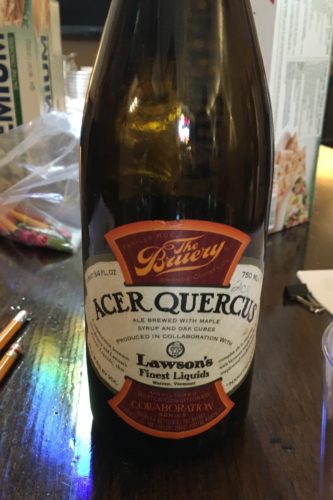BJCP Exam (“It’s done.”)
¶ by Rob FrieselSix beers judged in ninety minutes. Even more challenging than it sounded. But it’s done.
Like I broke down yesterday, this was an event almost a year in the making. Attended (and wrote up) twenty-four study group sessions. Judged (as a Provisional Judge) three flights over two competitions. (Plus kinda/sorta that one club style challenge.) One hundred thirty-four scoresheets (that’s like one every 2-3 days). And reading those style guidelines over and over and over again.
And while I averaged about 11 minutes to score each beer for those 134 practice beers… it just doesn’t adequately prepare you for the closed-book 15-minutes-per-beer of the actual exam. The time goes quickly. It’s intense.
The Experience
As I just said… the per-beer time goes very quickly, and I felt an intense pressure to get through each one. My writing hand cramped earlier and more frequently than I expected. That slowed me down more than I thought, especially since I was trying hard to make sure I had dark, clear, legible hand-writing.
They’re not messing around when they warn you to manage your time well. Given that I had (up to the exam) averaged 11 minutes to score a beer, having 15 minutes per beer seemed like a comfortable margin. So imagine my shock when that second beer was coming out and I was still trying to wrap up the first scoresheet. I managed to hit my stride going into the third beer of the flight, but for a moment there I had some real nail-biting.
Palate fatigue did not bother me as much as I’d anticipated. Granted I made liberal use of the water and saltines to keep my palate refreshed. That said, this was mercifully different from my experience from our study groups.
I didn’t remember as many of the specific specifics for each of the styles (1A, 13C, 13B, 21A, 7B, and 23C) as I’d hoped — but focusing on overall impression and balance during my last couple weeks of studying helped tremendously. Look for major faults and speak to those; then focus on balance and the overall impression and work out the score from there.
How Did I Do?
Short answer: We’ll see in a few weeks when the scores come back!
Long answer: we stuck around for a few minutes after the closing bell (i.e., after all our scoresheets were collected and secured) and our proctors explained — painting with broad strokes, of course — what score range each beer got, and what kind of feedback they gave. (Note: they didn’t tell us the consensus score, just like “Fair” vs. “Good” etc.)
And after hearing them walk through the six beers, I started to breathe a little easier. It sounded like more scores were reasonably close for most of the beers. But more importantly, it sounded like a lot of the qualitative feedback they gave had significant overlap with the feedback I’d written down.
I don’t want to speculate on my score and get myself all worked up — but I also believe that my hard work paid off.
What Worked
In no particular order, here are the things that I believed helped prepare me for the exam.
- The study group. Without a doubt, meeting on a regular cadence with other people who have their sights set on passing the exam was tremendously helpful. Being able to talk through what you got out of a beer (perception-wise) or why you scored it higher or lower… That was absolutely invaluable. If you’re gearing up to get certified and you don’t do anything else to prepare, get yourself a study group.
- Get out there and judge. I was lucky enough that, even with a Provisional rank, I was allowed to judge in a couple of local competitions. Being paired with a Certified (or higher) judge and seeing how well my own scores and perceptions matched with theirs… that was encouraging. (Also enlightening.) If you can’t judge, then at least try to steward — you’ll get a lot of the same exposure to the process.
- Drink… diversely. I made a point throughout the past year to seek out styles that I normally wouldn’t drink. I have fairly eclectic tastes to begin with, and I’m always happy to try anything once but… I sought out styles that I’d otherwise written off just so I could force myself through them. Just so I could take in a beer and say confidently: “I don’t like this, but it is absolutely hitting the mark for style.” (And/or: “I love this but it’s sooooooooooo not to-style.”)
- Practice your scoresheets. Do this a couple times a week. Sit down with a beer and a scoresheet and go through it top-to-bottom. Time yourself. Keep a log. Try to get your average time down to 10 minutes if you can. Look for patterns; when a beer takes “too long” to score, why?
- Keep notes. Those scoresheets? Stick them in a binder. Review them once in a while. Keep another binder with the style guide printed out. Highlight things. Annotate. Jot down notes about different styles. And/or the relationships between them. And/or different beers you’ve tried. Are there flavors or faults that you have a hard time perceiving? Do you consistently under-estimate carbonation or over-estimate bitterness?
- Quiz yourself. I did this two different ways. First, I took a notebook and went through each style individually. I wrote down everything I could remember about it from memory. I did this for all 92 of the classic styles. Then I went back through those notes and checked them — what did I get right? what did I get wrong? what did I miss? (I did pretty well, by the way.) And after I was all done with that, in the final couple days before the exam, I wrote down each of the style codes on index cards and quizzed myself again. I shuffled the deck of index cards and would pull one, roll a six-sided die, and focus in on one aspect of that beer. Pull “14B”, roll 4… “What’s the mouthfeel on a Scottish Heavy like?”
What (Else) I Should Have Done
For as well-prepared as I was, there are a couple of other things I could have done to get myself better prepared. Again, in no particular order.
- Judge more homebrew. Judging commercial beers can help you get familiar with how the styles are “supposed to” taste, but there’s nothing quite like getting an amateur product. It was unusual for us to get a commercial beer that would score much below a 32 — and most were 35 or better. But I also have a few memorable homebrew examples judged that were below 25. Nothing beats “the real thing” when it comes to getting that experience.
- Drink… more diversely. Even though I branched out from my usual preferred styles, I still played it a bit safe in retrospect. Thinking back to the commercial beers I bought for my at-home practice sessions, I tried to get in-category beers for the up-coming sessions — but even then I would find myself looking for “good” examples that I would enjoy. I needed to challenge my palate more.
- Score more often. As I look back over my notes, I scored a beer probably 5 nights per week when our study group first started. This fell off substantially after a few weeks. Granted, it’s hard to maintain that disciplined pace, but I think I would have benefited from it.
- Hard stop on the time when practicing. During all my self-guided practice sessions, I would start my stopwatch and count up. If I had to do it over again, I would set a 15 minute timer and have a hard stop when it went off. In other words, put the “exam day pressure” on even those practice beers. Can I really get a whole beer scored in 15 minutes? Where am I taking too much time? Etc. (Granted, even “counting up” I still realized that I took too much time on aroma.)
- Start the blind quizzing earlier. The notebook exercise and the “fill in the flashcards” exercises were both very valuable. But I waited until the last 4-6 weeks before the exam before I started that. I should have been doing that all along. Or, if not “all along” then at least for the past 3-4 months.
What Next?
First, we raise a glass and toast that the exam is complete!
Then we wait for the scores to come back. I’m hoping to know my score before sitting down to judge at the Champlain Valley Fair’s competition this year — but it’ll come when it comes.
And in the meantime, the club is already organizing the 2018-2019 BJCP study group. And while I won’t be dedicating every other Thursday to that group, I’m hoping to help a few of them complete their journey. Maybe I’ll even brew a couple 20-25 point Category 3 beers for their dump buckets…
Cheers!
About Rob Friesel
Software engineer by day. Science fiction writer by night. Weekend homebrewer, beer educator at Black Flannel, and Certified Cicerone. Author of The PhantomJS Cookbook and a short story in Please Do Not Remove. View all posts by Rob Friesel →4 Responses to BJCP Exam (“It’s done.”)
Pingback: BJCP Milestone: Recognized | found drama



Leave a Reply